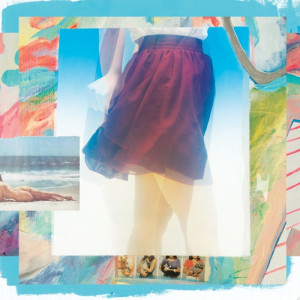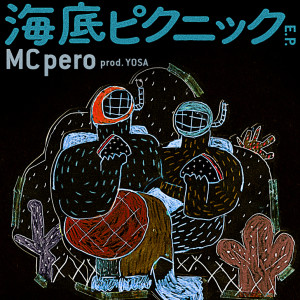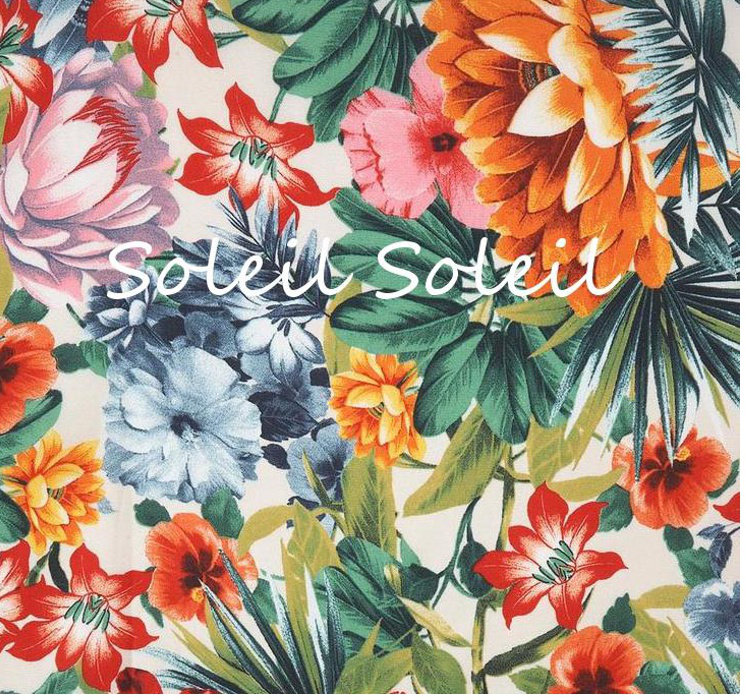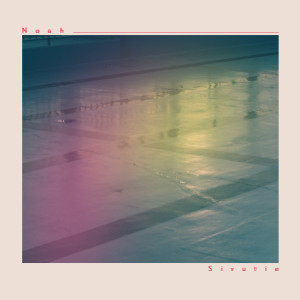Imagine your favorite pop songs, but recorded deep within a cave. That’s Parupunte’s debut album Primitive, a rough but formidable collection that manages to capture the Osaka duo in all of their scratchy glory, playing absorbing pop songs that sound like the were recorded deep inside a national park. Whatever the circumstances, the pair craft needly songs with big, sticky choruses buffed out by weird touches, whether it be spoken word backing tracks or drum ‘n’ bass finales (see the riveting “Yume Miteru”). Primitive offered a chance for a young indie outfit to show their chops writing glue-like songs in all their uneven glory.
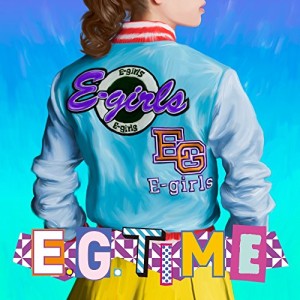
There are no shortage of cans of worms to pop open in relation to E-Girls rise to the top of the idol-ish pop pile in 2015 — one could dwell on how they flipped the idol script by making music aimed at women, or how the K-pop juggernaut actually lifted ideas (and producers) from them to make a summer banger. Yet why waste words when you can just get to the point — E.G. Time was the tightest collection of pop songs released by any Japanese group in 2015, literally on the first day of the year. It corrects the one mistake of last year’s equally fantastic Colorful Pop by cutting out all the ballads, leaving only a collection of high-energy pop songs and cover songs that gave a contemporary sheen to ’90s jams. It features the year’s best Yasutaka Nakata number, “Music Flyer,” wherein group vocals which had in recent years been reduced to a cutesy volume-up tool get retrofitted into a weapon, the song a bleacher-slapping shout. Elsewhere, they offered up the catchiest and sweetest takes on EDM in a year where the rumbling style was at peak popularity, and made Dreams Comes True sound good.
MCpero sits at a weird position right now. Women rap groups and artists gained a ton of momentum as the year came to a close, but the Tokyo artist lacks the pop bend most of these burgeoning projects possess. Yet she also seems out of place within more conventional Japanese hip-hop, as she told me earlier this year she feels she can’t go in as much as her male counterparts. Within this weird area — away from both the domestic trendiness of women rappers and the slight international buzz generated by someone like KOHH — the MC who also fronts a solid indie-rock outfit called Monotoons released two of the year’s absolute finest EPs around.
The Milk EP released at the very end of last year, serves as her intro, and it’s a wonderfully wonky one. Asian rap music in 2015 was defined by easy SEO optimization — meet “the Korean Migos,” and “the Korean OG Maco” — which was certainly on point and something none of the artists involved would deny. Yet the beauty of something like Milk is I have no idea who the cop-out comparison would be — over bubbly beats and samples of birds, MCpero bobs and weaves around the music, at times joyful and other times reflective. Katei Picnic builds on this, with the title track offering up a great take on the undersea rap song, and rounded out with a sweeter number. Whatever direction she went in and whoever jumped on the track alongside her, MCpero stood out on these songs and ultimately just sounded like herself.
Osaka’s Soleil Soleil uses a lot of diverse building blocks in the dance numbers making up his self-titled full length. Over the course of these 14 tracks, he jumps from local singers to samples, featuring voices from Akon to Zedd. Yet whatever serves as the foundation for the music on Soleil Soleil, the producer treats them with warmth which gives his jumpy house creations a sincere emotional core. Made all the brighter by his tropical lean — it seems unfair to call this “tropical house” considering he’s been fiddling around with the sound since 2011 — Soleil Soleil is his finest collection to date, floor-ready numbers with huge hearts, highlighted by his collaboration with rising Kyoto artist Little Bear “Love Is The Greatest Refreshment In Life.”

Tokyo’s LLLL has been exploring unease since the project’s early days, after forming in the wake of the 3/11 Earthquake and Tsunami, and across two albums released in 2015 showed that the ability to create tension has only gotten better. Faithful and Cruel cast catchy pop in the shadows, songs with a J-pop sheen taken to a darker, more anxious place.
This wasn’t a new development, though LLLL got better at it. The real intriguing change, though, was a wide variety of voices appearing over the jittery production, offering more perspectives for the project to explore. Whether gaining strength from the forceful voice of Meghan Riley or disrupting the voice of You’ll Melt More! idol Ano with drum ‘n’ bass percussion (or dropping Tupac into 2015 malaise), these two releases expanded the project’s worldview, adding new nerves to the mix or even offering some glimpses of salvation courtesy of Tokyo’s Metoronori, who delivered a spellbinding vocal turn on “Only To Silence.”
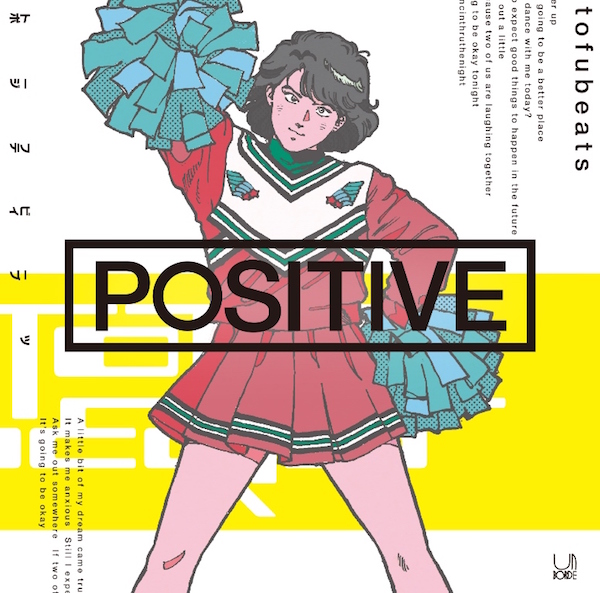
The Internet sure can be great, but do you ever check your history after falling down a YouTube hold? How did 3/4ths of The Fog Of War interrupt a series of K-pop videos, and why is it all bookended by a teen vlogging about their dog? It’s fun, but it sometimes feel like you could have done with a bit more focus. This has been a slipping point for Tofubeats, whose music feels like the Web condensed into song form, and even though he’s made plenty of fantastic songs touching on everything from rap to pure pop to acid house, the Kobe producer hasn’t necessarily made a great album, one that feels like a consistently solid listen from front to back. Like a late night online, plenty of it was fantastic…but some of it could have been structured better.
Positive is just that step forward, the tightest album he’s made yet, but without losing any of the pinballing energy that’s defined his music. Like previous collections, and especially last year’s major label starter First Album, Positive zips between genres, but Tofubeats sounds more workmanlike now, the pop of the title track crisper and even the manic electro-pop of “Stakeholder” sounds more refined. He’s goofy alongside rapper Kreva on “Too Many Girls,” and nails sentimentality about music on the sweet “Kurikaeshi No Music.” But most importantly, he’s learned how to make a major-label album that plays out just right — after a particularly chaotic stretch featuring the digital dancehall furnace of “Throw Your Laptop On The Fire” with Tetsuya Komuro and the drunken lament pop of “Without U” featuring America’s Skylar Spence, Tofubeats dives into the feather-bed sounds of “Suteki Na Maison,” just the right break. Everything that has made Tofubeats an exciting name to watch, from netlabel to Warner Brothers, remains, but Positive saw him piece it into something that worked great in the album format.

Many artists, once they get a sniff of something faintly resembling mainstream success, opt to savor it for as long as they can, with subsequent releases making the most of expanded budgets and space, resulting in long and oftentimes laborious listens. Suiyoubi No Campanella zipped the other way on Zipang — it clocks in at just under 33 minutes, making it an easy release to hit “repeat” on. It’s such an efficient listening experience that after a few spins, the biggest criticism I can think of for some of its songs is that they are too long — like, maybe “Ra” could have been better being less than four minutes.
Whatever complaints could be worked up, though, aren’t enough to derail how much the trio packed in to such a small frame. Traditional Japanese sounds grinded up against contemporary hip-hop and house touches in a way that never sounded like novelty, but rather as a very welcome spice that worked wonders alongside bass blasts. Suiyoubi combined the wild emotion of an outfit like group_inou and the border-smashing lead of the netlabel scene, making for a whirlwind sound that got more looks from the mainstream but which wasn’t really compromised on Zipang…the video for obvious big-time stab “Ra” looked like a Katy Perry diorama, but I’m not sold on a Jersey Club cut about golden rice constitutes a crowd-pleasing shift.
All those mainstream looks centered around lead vocalist — and public face of the group — Komuai, a cartoon tornado of a human who would have to be on a TV show if they weren’t the center of an off-kilter pop group. Yet the music on Zipang was balanced just right, giving her space to get irreverent plenty of times, but also deliver bleary-eyed house pop (“Medusa”) and showcase her voice, which could convey more drama in under two minutes than some Netflix binges (“Twiggy”). Hype around this group has already gotten Japanese media salivating, but forget about “breakthroughs” or “J-pop’s next great hope” chitter chatter, because Zipang is Suiyoubi No Campanella just doing their own wonderfully fucked up thing. More ears just happen to be pointed in their direction.

It’s the summer of 2012, and I’m drunkenly stumbling away from Shibuya’s Home live house, only hours before the sun rises. I’m slouching towards the main street after a show by Moscow Club — well, I think it was anyway. Those ¥500 Heartlands will get to you, especially when you are a 25-year-old nimrod new to the capital, dumb enough to cough up the equivalent of $40 a week in cab fare back to your apartment in Nerima a week. My bank account suffers, but I could care less when I’m in the midst of a golden season in Tokyo…ne, Japanese…indie music, where dozens of artists play shows across the city over the course of four months, and get honest-to-goodness attention from non-Japanese music blogs. Beyond my own podunk affair, of course. Everything is exciting and gripping and the music is incredible. The city’s music community seems on the razor edge of something bigger.
And then I wake up to find that it is 2015, and I’m trying to stop myself from going on that Tweet storm about some idol group that nobody but diehard converts cares about, thankfully realizing “who cares’ before hitting that big blue “send” button. And there are a lot of days like this, not specifically tied to anything specific, but collections of hours spent wondering if music just doesn’t mean that much to me anymore, if I should just go on the subway to listen to another podcast hosted by a guy trying to be Howard Stern 2.0 and imagine what my application to some PR company would look like.
Then something like Outfit Of The Day comes out, by a band I thought had just up and quit like Moscow Club, and every feeling comes rushing back. I hear the four-piece sewing Kraftwerk together with Frankie Knuckles for their own European jaunt, and my heart races at the sonic diversity and playfulness. I hear the opening jangle of “Band Of Outsiders” and recall every Japanese indie-pop song that made me want to spend my waking hours feeling melancholy and occupying record stores. I hear the faint echoes of groups gone silent or into the shadows — Hotel Mexico, Ellen Never Sleeps, etc. — in “Margaret” and “Ivy League” and think back on those glory days. I hear the twinkling longing of “Celine” and recall the swirl of emotions countless bands and artists conjured up in me just a few years ago, and why I spend time staring intently at a WordPress Dashboard at all. I listen to Outfit Of The Day and am reminded of why I love all of this so much.
How many sounds surprised you over the last 12 months? I don’t mean, like, artists who you thought weren’t that compelling suddenly releasing a great song, or even a song catching you off guard. I mean sound, individual noises, sounding alien and tethered to no trends. Plenty of artists made great music over the course of 2015 — I swear this isn’t a grump session — but how many explored just how far they could push noises? At this point, I’m used to what to expect, whether that be seeing the waveform of a song on SoundCloud, or seeing music bunched into playlists like “breezy tunes for picnic — reggae.”
Bless Taquwami, then, for spending 2015 seeing how much he could turn out individual sounds. Dude has always been ahead of everyone else, keeping a low profile and pushing his music into alternate dimensions. His two EPs from this year explored two different ends of the spectrum — Aj Mo Ka / Ka Ao Um played out like a just-under-ten-minute journey, Taquwami blanketing his spacy synth sounds with piano and acoustic guitar. Silence played just as big a role in these two songs, helping ramp up the drama created by frazzled electronic sparkles and what sounded like victory-on-the-front fare from a dusty radio. It was a deeply melancholy listen at times, but always sonically intriguing.
That bloomed on this fall’s Moyas EP, wherein he explored just how far he could bend familiar sounds into something new. Over four songs, Taquwami threaded together disparate noises, all of which sounded like they were seconds away from t-boning one another and making a mess, but always placed just right to create compelling music. “The Gathering” imagined a color-inverted Enchanted Tiki Room with a hip-hop beat made out of clock ticks and human gasps. The title track swirled vocals into alien dialects, and rounded them out with pan flutes and hyperspace wirrs, while “Otogi Bass” turned a bunch of sounds that have seemingly been exhausted by “trap” EDM — that fucking air siren — and warped it into something more thrilling and life affirming. It was a noisy year, but nobody probed sound like Taquwami and came out on the other side with music so daring and endearing.
Year-end lists generate a lot of phenomenal writing and reflection for the same reason they create a lot of garbage paragraphs — because the very nature of the beast requires blurbs to be all encompassing, and of connecting songs and albums to matters that, in most cases, are far bigger than they are. Trust me, I’ve been there. But what happens when the album you love the most is also one shirking away from the outside world, moving away from the chaos of Earth 2015 in favor of lonely forests and imagined ocean canyons? What happens when you choose quiet in a year that was unavoidably noisy?
Ayuko Kurasaki’s music under the name Noah has always felt far away, her breezy voice and barely-there electronics sounding alien from the sonic world around her. Whether she was creating skeletal beats or teaming up with a Texas “vapor rapper” to create hip-hop out of fading neon, Noah’s music sought quieter landscapes to reside in. Influenced by a childhood spent surrounded by Hokkaido’s lush nature and a classical music background — “I used to draw or play piano in our backyard, under starlit skies with my pet dog” — she has created spacious, refined songs, the perfect backdrop for her voice to breeze over.
Sivutie, her proper full-length debut, is a reflective collection. Noah makes sparse tracks drawing from ambient music and her childhood piano lessons, just the right backdrop for her voice to swoop and sway. Yet she isn’t an artist interested in showing off her vocal abilities — though her singing is as captivating as any Japanese artist going today — but rather she sounds like a wisp, oftentimes covered in a powder of distortion and sometimes pitch-shifted into something ghostly. Sivutie isn’t afraid of sudden changes, whether that be linguistic or in tone — “(Interlude – Doll)” is simply a piano number, and it is followed up by one of her loudest songs, the droning “Tadzio.”
Yet whatever direction she goes in, Sivutie is consistently gorgeous, an artist taking her time to create an enveloping sonic world where vocals don’t have to be talent-show-huge to be stunning. Sadness bleeds through on the slow-motion whale song “Unspoken,” while she made one of the year’s most unsettling songs in the late-night drizzle of “Motion.” Yet she also finds joy on “Flaw,” and peace amidst the toy-box chimes and nature samples of “Times.”
What sticks with me about Sivutie is the space the album allows for regardless of the emotion called up, for reflection and for wrestling with the feelings her blur of sound brings out. Her singing never argues for something or even tries to convey direct thoughts of something…it is simply another instrument in her sound.
Few songs or albums felt this way in 2015, a year where shouting louder than everyone else tended to work wonders in music and everything tended to be an argument for something else…even if it wasn’t. That distracts a bit from the sheer craftsmanship at the center of Sivutie, as Noah made the most beautiful album out of Japan this year, one which would have been just as absorbing in any year. But it felt extra sweet in this one.
Ultimately, it wasn’t purely a retreat from the clanging and constant bad news of 2015, but an album of meditation and healing. “Some of my songs are about dreams, but it is something more realistic,” Noah said earlier this year. “They are not for escape, but hopefully they’re something to make your life better.” Sivutie was a masterclass in that.

